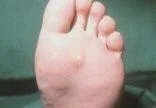
Diagnosis
The warts may have the appearance of thick, scaly skin. They can occur as small, single warts or can cluster into large areas. These clustered warts are called mosaic warts. They often resemble plantar calluses. A simple way to tell the difference between a wart and a callous is to squeeze the lesion between your fingers in a pinching fashion. If this is painful, it is likely that the lesion is a wart. A callous is generally not painful with this maneuver, but is tender with direct pressure, by pressing directly on the lesion. Other lesions on the bottom of the foot that are often confused with plantar warts are porokeratoses and inclusion cysts.
Treatment of Warts
There are many over-the-counter treatments available for warts. Unfortunately these are usually ineffective at treating warts on the feet. Plantar warts are very resistant to all types of treatment, and several treatments may be required for complete resolution. Some of the methods that the doctors at Mount Kisco Foot Specialists, PLLC use to treat warts include debridement (shaving of the wart), topical medications, cryotherapy (freezing), electrofulgeration (burning), surgical excision, and oral medications. After discussing all the options, the doctors will help the patient choose which treatment, or combination of treatments, is best for them. Usually, we are able to treat the warts utilizing the methods that cause minimal discomfort and do not involve the risk of scar formation.
